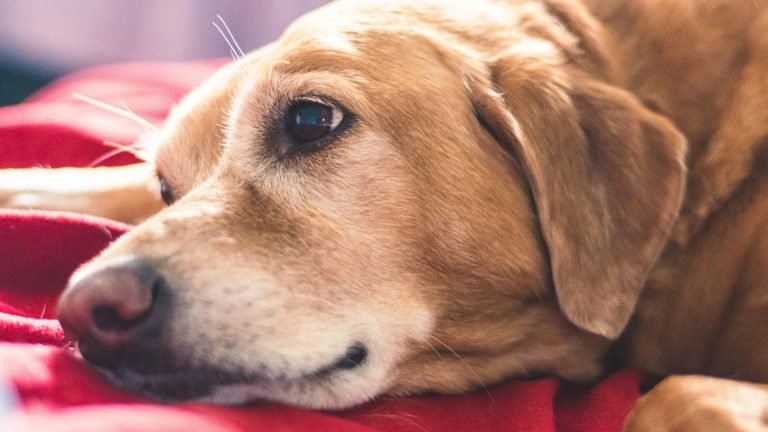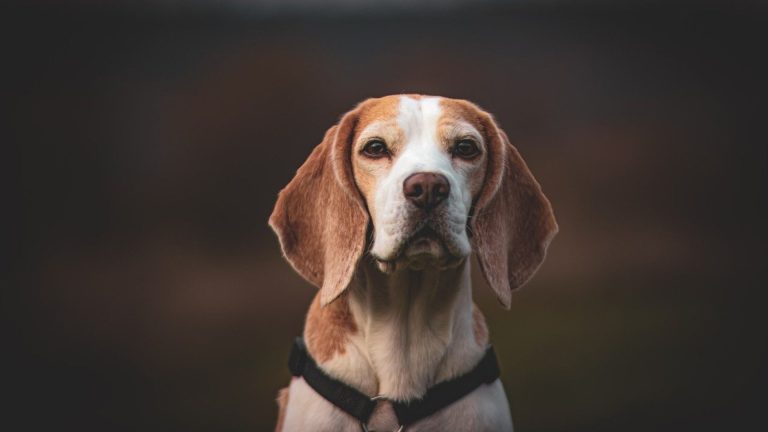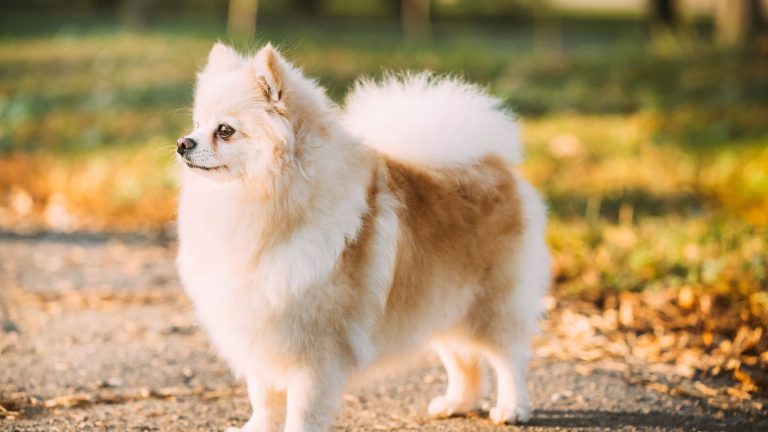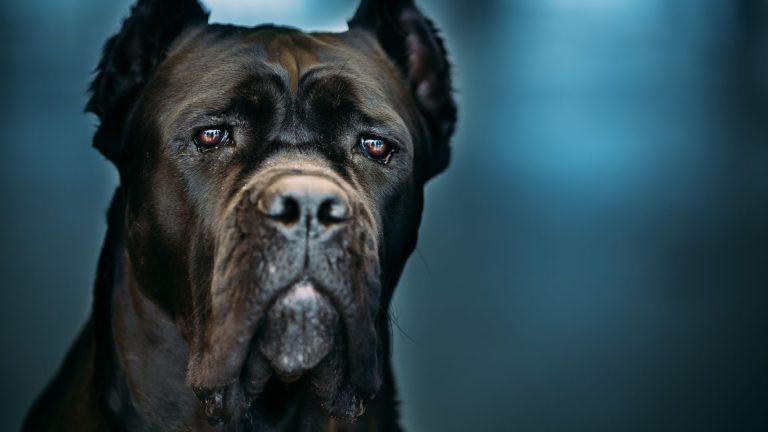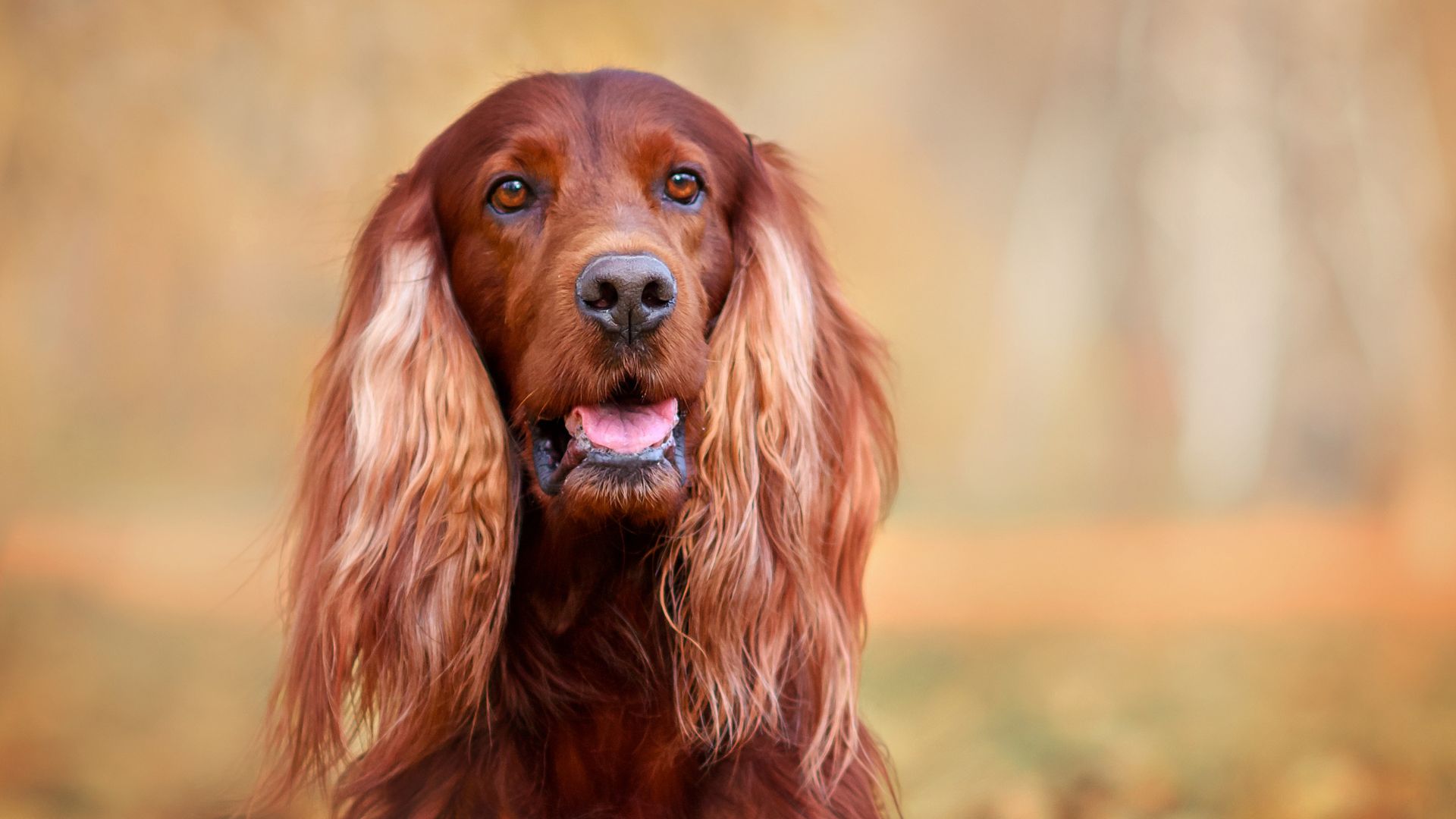
Contents
Deep-chested dog breeds are unique in their physical structure. These breeds have a deep, narrow chest, giving them a distinctive silhouette. Common examples include the German Shepherd, Great Dane, and Labrador Retriever. They are known for their strength, agility, and often, their working capabilities.
Understanding deep-chested dog breeds is crucial for potential owners. These dogs have specific needs and health considerations. For example, they are more prone to bloat, a serious condition that can be life-threatening. Knowing how to care for them can prevent many health issues and ensure a happy, healthy life for your pet.
In this article, we will explore the characteristics of deep-chested dog breeds. We will discuss popular breeds, their care requirements, and how they fit into family life. Additionally, we will offer tips for potential owners on choosing the right breed and preparing your home. By the end, you will have a comprehensive understanding of these fascinating dogs and be well-prepared to welcome one into your home.
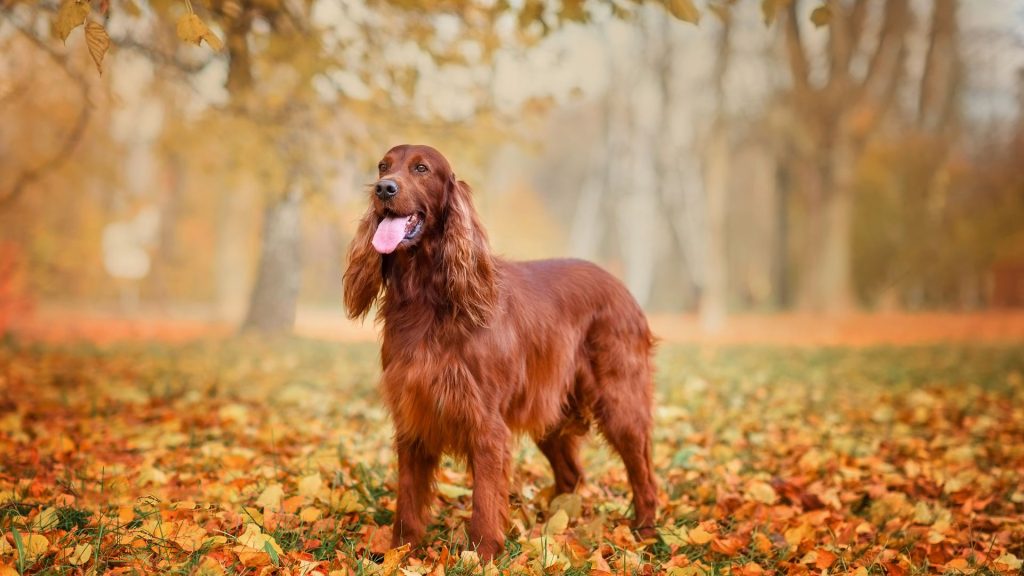
What Are Deep Chested Dog Breeds?
Deep-chested dog breeds have a chest that is taller than it is wide, giving them a distinct appearance. This structure allows for a larger lung capacity, which is beneficial for endurance and strength. Common breeds include the German Shepherd, Great Dane, and Boxer. These dogs often excel in roles that require stamina and power, such as working, herding, or guarding.
Benefits and Challenges of Owning a Deep-Chested Dog
Owning a deep-chested dog comes with many benefits. These dogs are typically strong, loyal, and intelligent. They can be excellent companions for active families and individuals. Their endurance makes them great partners for outdoor activities like hiking and running.
However, there are challenges to consider. Deep-chested dogs require regular exercise to maintain their health and prevent obesity. They also need mental stimulation to avoid boredom, which can lead to destructive behaviors. Additionally, their size and energy levels might not be suitable for all living situations, especially small apartments.
Common Health Considerations
One of the most critical health concerns for deep-chested dogs is bloat, also known as gastric dilatation-volvulus (GDV). Bloat occurs when the stomach fills with gas and twists, cutting off blood supply. This condition is life-threatening and requires immediate veterinary attention. Symptoms include a distended abdomen, restlessness, and difficulty breathing.
Preventing bloat involves several strategies. Feeding smaller, frequent meals instead of one large meal can help. Avoiding vigorous exercise right after eating is also important. Additionally, using specially designed food bowls that slow down eating can reduce the risk.
Regular veterinary check-ups are crucial for early detection and management of other potential health issues. By understanding and addressing these needs, owners can provide a safe and loving environment for their deep-chested dogs.
Popular Deep Chested Dog Breeds
German Shepherd
The German Shepherd is one of the most recognizable deep-chested dog breeds. Originating in Germany in the late 19th century, these dogs were initially bred for herding sheep. Their intelligence, strength, and versatility soon made them popular in various roles, including police and military work.
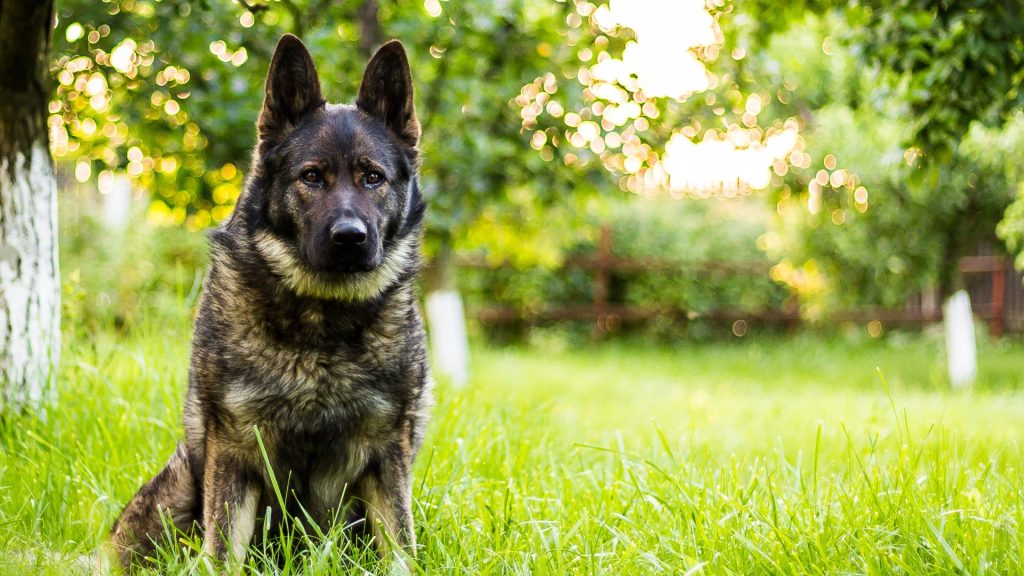
German Shepherds are known for their loyalty and protective nature. They form strong bonds with their families and are often used as guard dogs. Their deep chest provides them with exceptional lung capacity, aiding their endurance and stamina. This makes them excellent working dogs, capable of handling rigorous tasks.
Health considerations for German Shepherds include hip dysplasia and bloat. Regular exercise and a balanced diet are crucial to maintaining their health. Early training and socialization are also essential to ensure they develop into well-behaved adults.
Great Dane
The Great Dane, often referred to as the “gentle giant,” is another popular deep-chested breed. These dogs have a majestic appearance, with males standing up to 32 inches tall at the shoulder. Originating from Germany, Great Danes were initially bred for hunting large game, such as wild boar.
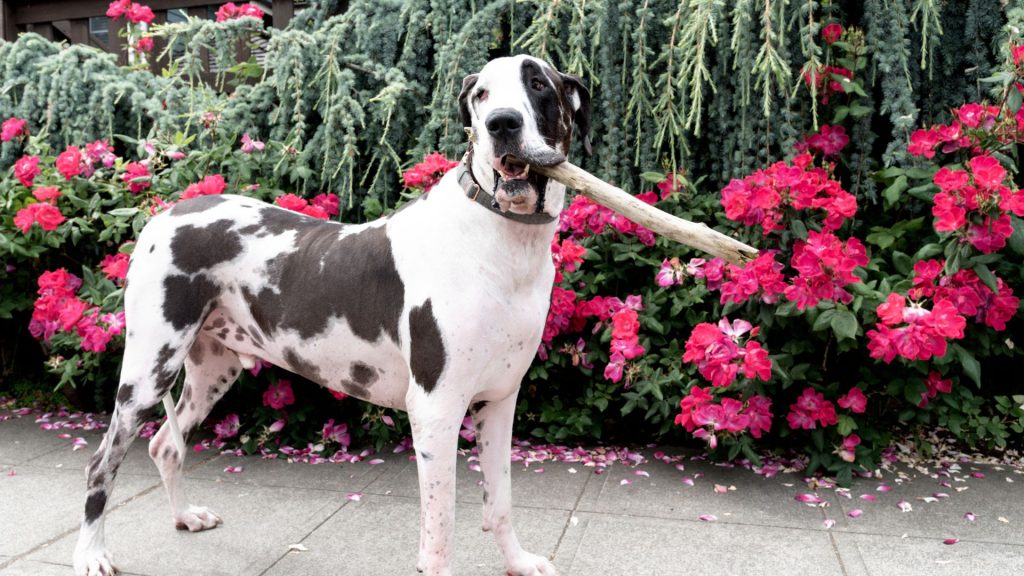
Despite their size, Great Danes are known for their gentle and friendly nature. They are excellent family pets and get along well with children and other animals. Their deep chest gives them a regal posture, but it also makes them prone to bloat.
Owners should be aware of the health risks associated with Great Danes, including heart disease and hip dysplasia. Regular veterinary check-ups and a proper diet can help manage these issues. Due to their size, Great Danes also require spacious living conditions and regular exercise to maintain their health.
Labrador Retriever
Labrador Retrievers are one of the most popular dog breeds worldwide. Known for their friendly and outgoing nature, they make excellent family pets and working dogs. Originally from Newfoundland, Labradors were bred to assist fishermen, retrieving nets and fish from the water.
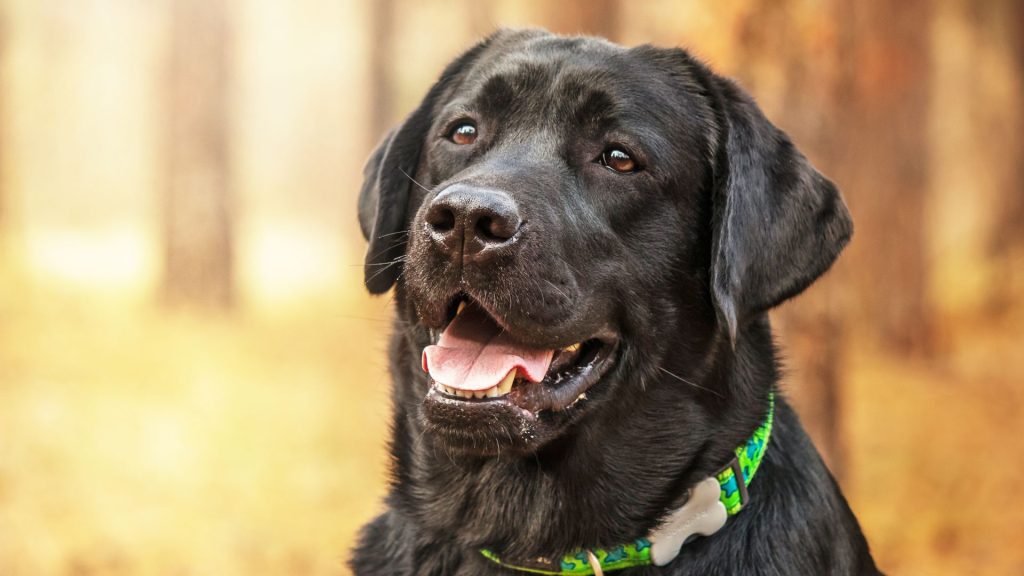
Labradors have a sturdy, athletic build with a deep chest that supports their powerful lungs. This physical trait makes them excellent swimmers and highly energetic dogs. They excel in various roles, including search and rescue, therapy, and assistance for people with disabilities.
Health concerns for Labradors include obesity, hip dysplasia, and bloat. Maintaining a healthy diet and regular exercise routine is vital to prevent these issues. Early training and socialization are also important to channel their energy and intelligence into positive behaviors.
Boxer
Boxers are known for their playful and energetic nature. Originating in Germany, they were initially bred for hunting and guarding. Their muscular build and deep chest give them a powerful and athletic appearance, making them excellent working dogs.
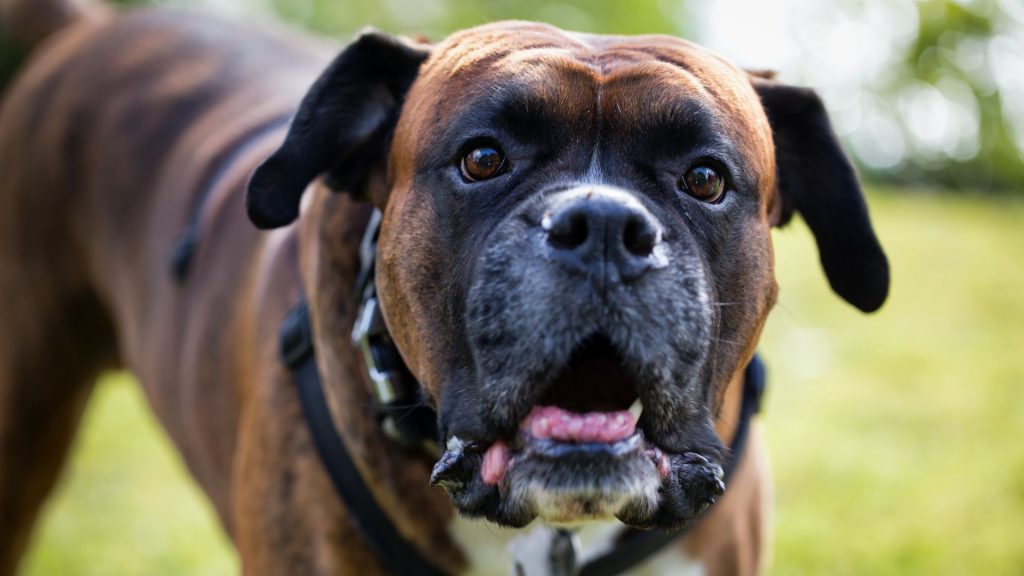
Boxers are loyal and affectionate, forming strong bonds with their families. They are particularly good with children and can be protective, making them excellent watchdogs. Their high energy levels require regular exercise to keep them healthy and happy.
Health considerations for Boxers include heart conditions, hip dysplasia, and bloat. Regular vet check-ups and a balanced diet are essential to manage these health risks. Boxers also benefit from early training and socialization to ensure they grow into well-mannered adults.
Doberman Pinscher
The Doberman Pinscher is a sleek and powerful deep-chested breed. Developed in Germany in the late 19th century, Dobermans were initially bred for protection and companionship. Their deep chest and muscular build give them a commanding presence.
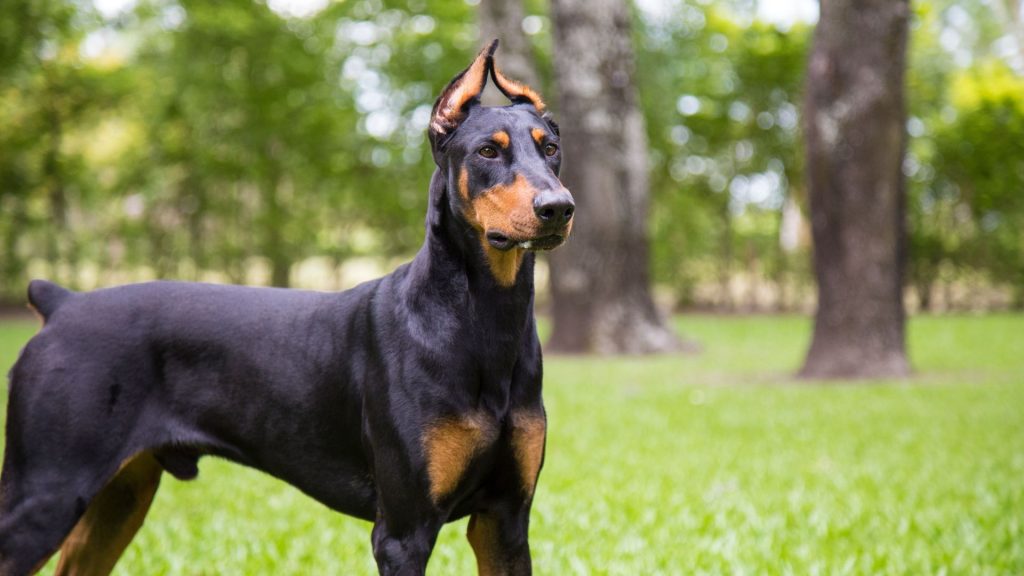
Dobermans are known for their intelligence and loyalty. They are often used in police and military work due to their trainability and protective instincts. Despite their fierce appearance, they can be very affectionate and form strong bonds with their families.
Health concerns for Dobermans include heart disease, hip dysplasia, and bloat. Regular exercise, a proper diet, and routine vet visits are essential to maintaining their health. Early training and socialization are crucial to harness their intelligence and energy positively.
Rottweiler
Rottweilers are powerful and robust dogs with a deep chest that supports their strong build. Originating from Germany, they were initially used for herding and guarding livestock. Today, they are known for their loyalty, strength, and protective nature.
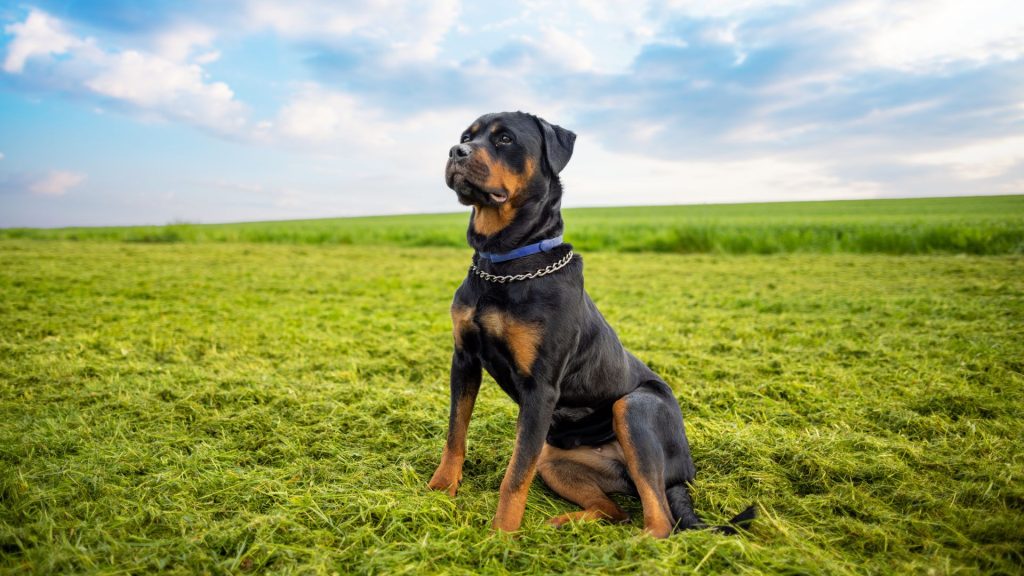
Rottweilers are excellent family pets and can be very affectionate with their loved ones. They require regular exercise to maintain their muscular physique and mental stimulation to prevent boredom. Their deep-chested build makes them prone to bloat, so proper feeding practices are essential.
Health issues for Rottweilers include hip dysplasia, heart problems, and bloat. Ensuring a balanced diet, regular exercise, and routine veterinary care can help manage these risks. Early socialization and training are also important to develop a well-behaved and balanced Rottweiler.
Weimaraner
The Weimaraner, also known as the “Silver Ghost,” is a deep-chested breed known for its sleek, gray coat and striking blue or amber eyes. Originating from Germany, Weimaraners were bred for hunting large game like deer and boar. Their deep chest provides them with the lung capacity needed for endurance and speed.
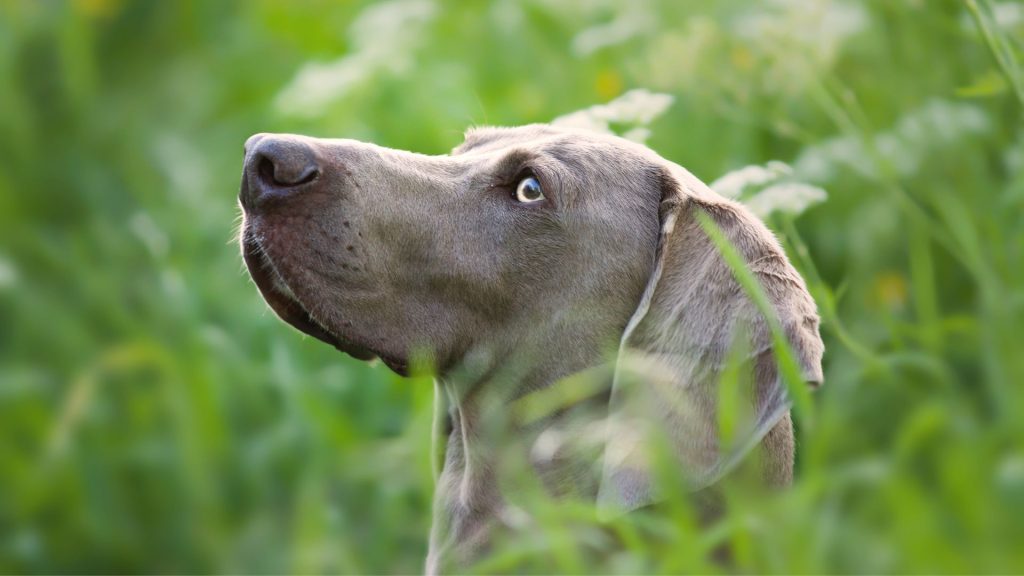
Weimaraners are energetic, intelligent, and affectionate. They form strong bonds with their families and require regular exercise to channel their energy. Their athletic build and deep chest make them excellent companions for outdoor activities like running and hiking.
Health considerations for Weimaraners include hip dysplasia, bloat, and various eye conditions. Maintaining a healthy diet, regular exercise, and routine vet check-ups are essential for their well-being. Early training and socialization help in managing their high energy levels and preventing behavioral issues.
Vizsla
The Vizsla is a medium-sized, deep-chested breed known for its agility and speed. Originating from Hungary, Vizslas were bred for hunting and retrieving. Their deep chest allows for efficient lung capacity, supporting their athleticism and endurance.
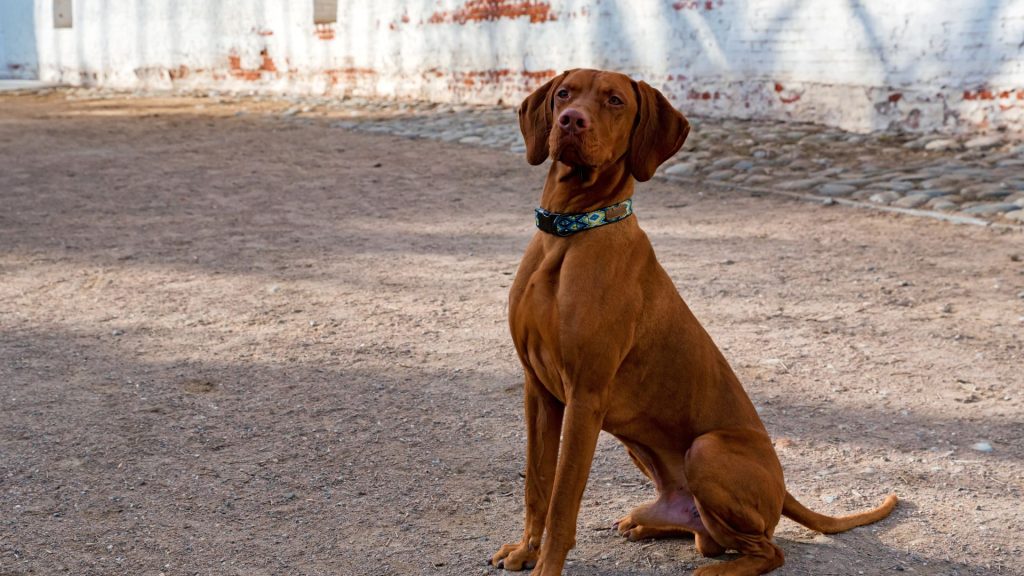
Vizslas are affectionate, loyal, and highly energetic. They require regular physical and mental stimulation to prevent boredom and destructive behaviors. Their deep-chested build makes them prone to bloat, so careful feeding practices are important.
Health issues for Vizslas include hip dysplasia, epilepsy, and bloat. Ensuring regular exercise, a balanced diet, and routine veterinary care can help manage these risks. Early training and socialization are crucial to developing a well-rounded and obedient Vizsla.
Irish Setter
Irish Setters are known for their beautiful, deep red coats and deep-chested build. Originating from Ireland, they were bred for hunting and retrieving game. Their deep chest provides them with the lung capacity needed for endurance and speed in the field.
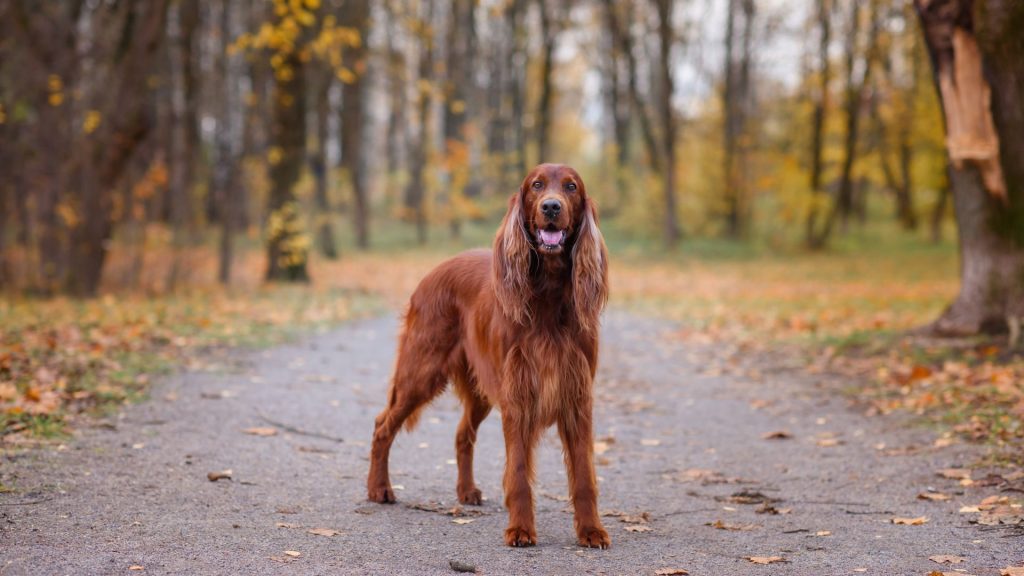
Irish Setters are friendly, energetic, and affectionate. They make excellent family pets and get along well with children and other animals. Regular exercise is essential to keep them healthy and happy, as they have high energy levels.
Health considerations for Irish Setters include hip dysplasia, bloat, and various eye conditions. Maintaining a proper diet, regular exercise, and routine vet visits are vital for their health. Early training and socialization help in managing their high energy levels and ensuring good behavior.
Greyhound
The Greyhound is a sleek, deep-chested breed known for its incredible speed and agility. Originating from ancient Egypt, Greyhounds were bred for hunting and racing. Their deep chest allows for a large lung capacity, supporting their athleticism and endurance.
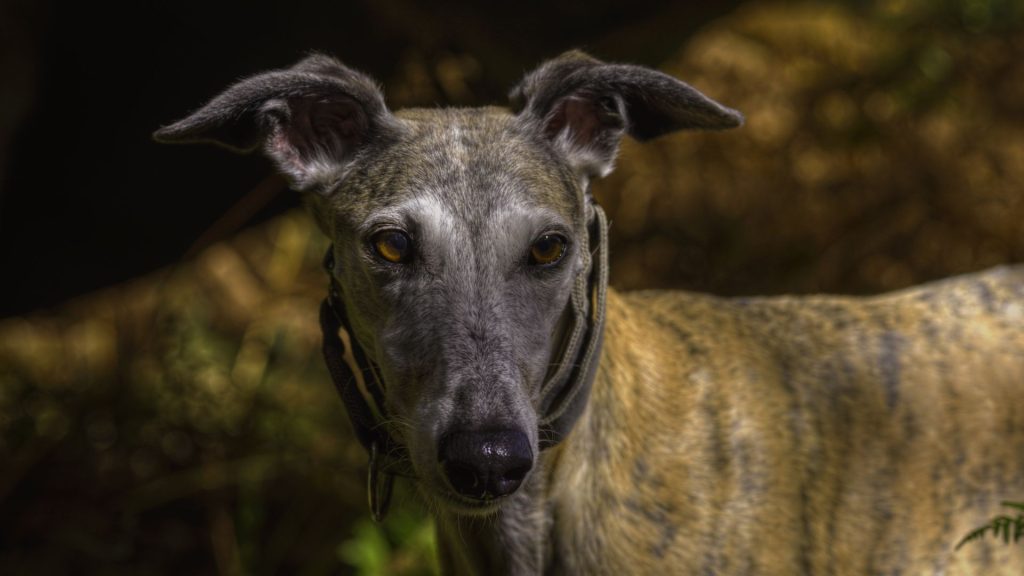
Greyhounds are gentle, friendly, and laid-back. Despite their reputation as racing dogs, they are quite content with moderate exercise and plenty of rest. Their deep-chested build makes them prone to bloat, so careful feeding practices are important.
Health issues for Greyhounds include hip dysplasia, bloat, and various heart conditions. Ensuring a balanced diet, regular exercise, and routine veterinary care can help manage these risks. Early training and socialization are crucial for developing a well-behaved and balanced Greyhound.
This comprehensive overview of popular deep-chested dog breeds highlights their unique characteristics, benefits, and challenges. Understanding these aspects can help potential owners make informed decisions and provide the best care for their deep-chested dogs.
Caring for Deep Chested Dog Breeds
Nutrition and Diet Tips
Proper nutrition is crucial for deep-chested dog breeds. These dogs have unique dietary needs due to their size and predisposition to bloat. Feeding them smaller, more frequent meals can help prevent this condition. Avoiding one large meal a day is key. High-quality, balanced dog food that meets their specific nutritional requirements is essential. Incorporate proteins, healthy fats, and essential vitamins and minerals.
Additionally, avoid feeding your dog right before or after vigorous exercise. This can reduce the risk of bloat. Use specially designed slow-feeding bowls to prevent them from eating too quickly. Fresh water should always be available, but limit water intake immediately after meals to further reduce bloat risk.
Exercise Requirements
Regular exercise is vital for the health and well-being of deep-chested dogs. These breeds are typically energetic and require ample physical activity to stay healthy and happy. Daily walks, playtime, and activities like hiking or running are excellent ways to keep them engaged. For breeds like Greyhounds and Boxers, sprinting and agility exercises can be beneficial.
However, exercise should be balanced. Too much high-impact activity can strain their joints and lead to injuries. Ensure they have time to rest and recover between vigorous activities. Mental stimulation is equally important. Incorporate training sessions, puzzle toys, and interactive games to keep their minds sharp and prevent boredom.
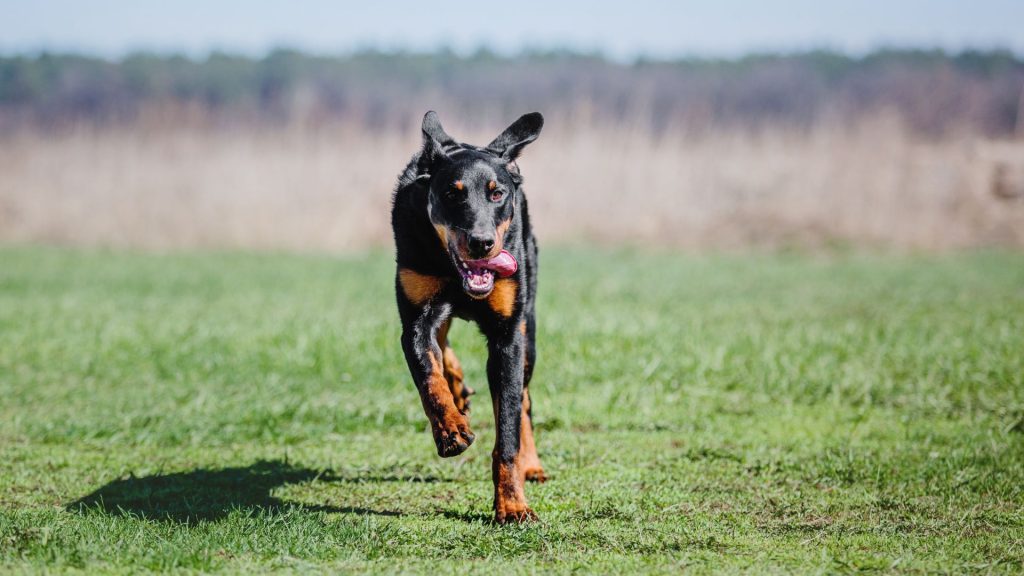
Grooming and Hygiene
Grooming needs vary among deep-chested breeds. Regular brushing helps maintain a healthy coat and reduces shedding. Breeds like the Labrador Retriever and German Shepherd benefit from weekly brushing, while the Great Dane and Greyhound may require less frequent grooming.
Bathing should be done as needed, typically every few months, unless they get particularly dirty. Use a mild dog shampoo to avoid skin irritation. Regularly check and clean their ears to prevent infections, especially for breeds with floppy ears like the Weimaraner. Nail trimming is also essential to prevent overgrowth and discomfort.
Training and Socialization
Training and socialization are crucial for deep-chested dogs. These breeds are often intelligent and eager to please, making them highly trainable. Start training early with basic commands like sit, stay, and come. Use positive reinforcement techniques, such as treats and praise, to encourage good behavior.
Socialization is equally important. Expose your dog to various environments, people, and other animals from a young age. This helps them develop confidence and reduces the risk of behavioral issues. Group training classes can be beneficial for both training and socialization.
Preventive Health Care
Preventive health care is essential for managing the health risks associated with deep-chested breeds. Regular veterinary check-ups can help detect and address health issues early. Vaccinations, parasite prevention, and routine health screenings are vital components of their preventive care.
Given their predisposition to bloat, it’s crucial to recognize the symptoms early. Signs of bloat include a distended abdomen, restlessness, drooling, and difficulty breathing. If you notice these symptoms, seek veterinary attention immediately.
Additionally, consider implementing preventive measures such as gastropexy, a surgical procedure that can reduce the risk of bloat. Discuss this option with your veterinarian, especially if your dog is at high risk.
Creating a Safe Environment
Creating a safe environment for your deep-chested dog is essential. Ensure they have a comfortable and spacious living area. Provide them with a suitable bed that supports their joints and prevents pressure sores. Avoid leaving small objects or toys that they can swallow within their reach.
Make sure your home and yard are secure to prevent escapes. Deep-chested dogs can be strong and determined, so sturdy fencing is a must. Supervise them during playtime to prevent injuries and ensure they are safe.
Caring for deep-chested dog breeds requires attention to their specific needs. Proper nutrition, regular exercise, grooming, training, and preventive health care are key components of their care. By understanding and addressing these needs, you can ensure your deep-chested dog leads a happy, healthy, and fulfilling life.
Deep Chested Dog Breeds and Families
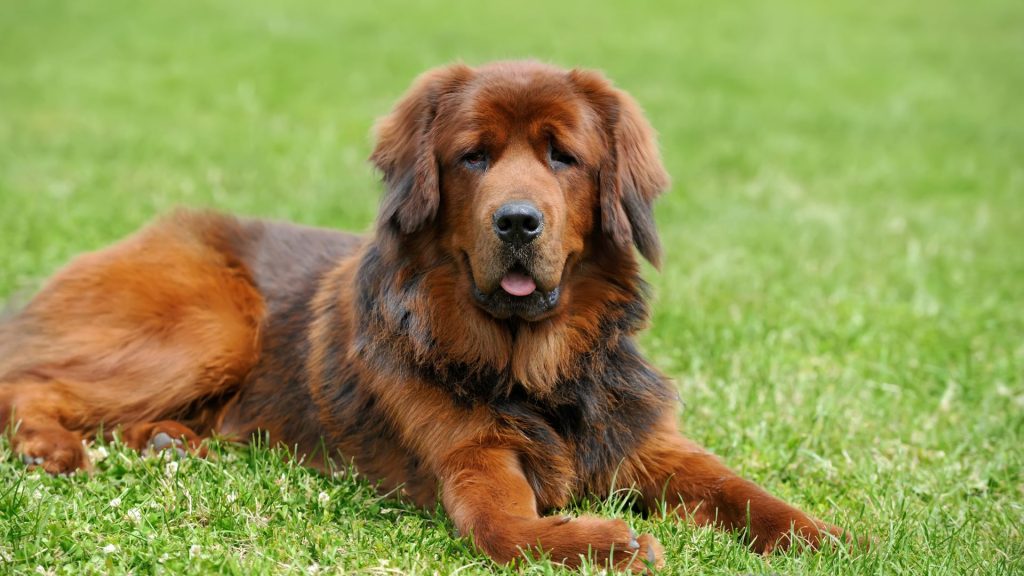
Suitability for Families and Children
Deep-chested dog breeds can make wonderful family pets. Their loyal and protective nature often makes them great companions for families with children. Breeds like the Labrador Retriever and Boxer are known for their friendly and patient demeanor. They enjoy playing and interacting with kids, often forming strong bonds.
However, it’s important to consider the size and energy level of these breeds. Larger breeds like the Great Dane and German Shepherd can accidentally knock over small children during play. Supervision is essential to ensure safe interactions. Teaching children how to properly interact with dogs, including respecting their space and not disturbing them while eating or sleeping, is crucial for harmonious relationships.
Interaction with Other Pets
Many deep-chested dog breeds can get along well with other pets if properly socialized from a young age. Socialization helps them learn to interact positively with other animals. Breeds like the Labrador Retriever and Weimaraner are generally sociable and can live harmoniously with other dogs and even cats.
However, some breeds, like the Doberman Pinscher, may have a strong prey drive, making them less suitable for homes with smaller pets. Early socialization and training can help manage this instinct. Always introduce new pets gradually and under supervision to ensure a smooth transition.
Best Living Conditions and Environments
Deep-chested dog breeds require environments that cater to their size and activity levels. Spacious homes with access to a secure yard are ideal. These dogs need room to move and play. Breeds like the Greyhound and Vizsla, which have high energy levels, benefit from having a yard where they can run and explore.
For apartment living, smaller deep-chested breeds like the Boxer can adapt, provided they receive adequate exercise. Regular walks and trips to a dog park can help meet their physical and mental needs. Regardless of living conditions, ensure they have a comfortable resting area with supportive bedding to prevent joint issues.
Tips for Potential Owners
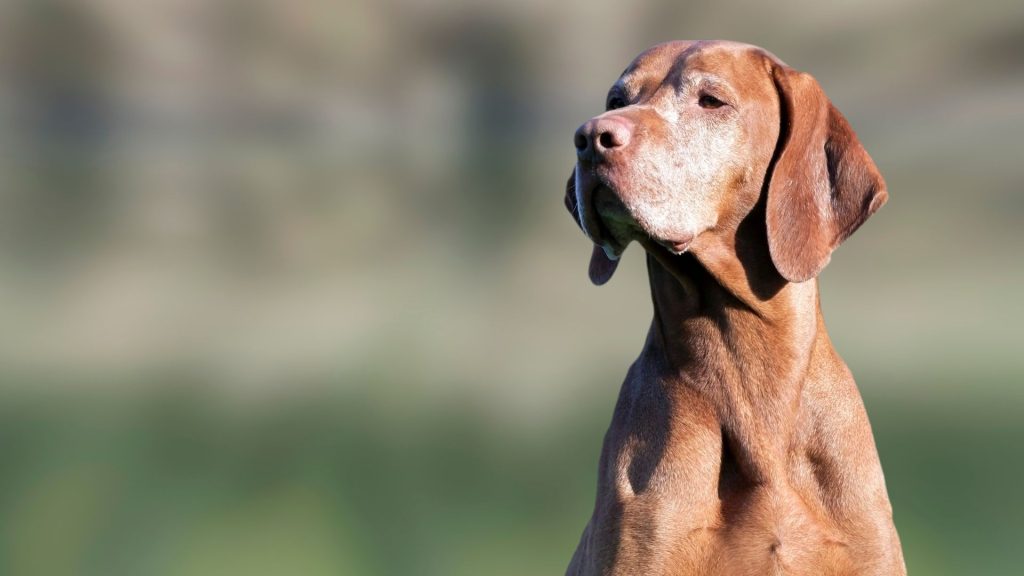
Choosing the Right Breed for Your Lifestyle
When choosing a deep-chested dog breed, consider your lifestyle and living situation. Active individuals or families who enjoy outdoor activities may find breeds like the German Shepherd or Labrador Retriever to be excellent companions. These dogs thrive in environments where they can exercise regularly and engage in activities.
Conversely, if you prefer a more relaxed lifestyle, breeds like the Great Dane or Greyhound may be more suitable. Despite their size, these breeds often enjoy lounging and require moderate exercise. Evaluate your ability to meet the breed’s exercise, grooming, and training needs before making a decision.
Preparing Your Home for a Deep-Chested Dog
Preparing your home for a deep-chested dog involves creating a safe and comfortable environment. Ensure your home is pet-proofed by removing hazardous items and securing areas where the dog could get injured. Provide a designated space for your dog with a comfortable bed and access to water.
Invest in sturdy toys that can withstand chewing, and consider slow-feeder bowls to help prevent bloat. Create a routine that includes regular feeding times, exercise, and training sessions. Establishing a routine helps your dog feel secure and can aid in training.
Finding Reputable Breeders or Adoption Options
Finding a reputable breeder or adoption option is crucial for ensuring you get a healthy and well-adjusted dog. Research breeders thoroughly, looking for those who prioritize health testing and proper socialization of their puppies. Ask for references and visit the breeding facility to see the conditions firsthand.
Adoption is also a great option. Many deep-chested breeds can be found in shelters and rescues. Organizations often have dogs of various ages, from puppies to adults. When adopting, inquire about the dog’s history, health, and behavior to ensure a good match for your home.
Conclusion
Deep-chested dog breeds are unique and bring many benefits to families. Understanding their specific needs, from health considerations to proper care, is essential for potential owners. By choosing the right breed, preparing your home, and providing consistent care, you can enjoy a fulfilling and loving relationship with your deep-chested dog. These dogs offer loyalty, companionship, and joy to those who understand and meet their needs.

Hello, I’m Donna Carter, the founder and writer behind PetFleck.com. My journey with dogs started years ago, and it’s been a passion that has only grown stronger over time. I’ve always been fascinated by the unique behaviors and characteristics of different dog breeds, and this curiosity has led me to dive deep into the world of canine studies.
My love for dogs is the driving force behind everything I do. I’ve dedicated countless hours to researching and understanding the nuances of dog care, training, and breed-specific traits. This dedication helps me create content that is not only informative but also genuinely helpful for fellow dog lovers and owners.
At PetFleck, I combine my extensive knowledge and hands-on experience with my passion for dogs to provide valuable insights and tips. Whether it’s exploring different breeds or offering practical advice on dog care, I aim to share knowledge that makes a real difference in the lives of dogs and their families.
I’m thrilled to share my love for dogs with you through my writing. I hope my articles inspire and inform, helping you to better understand and appreciate the incredible bond we share with our furry friends.
Thank you for visiting PetFleck.com, and I look forward to connecting with you through our shared love of dogs!

